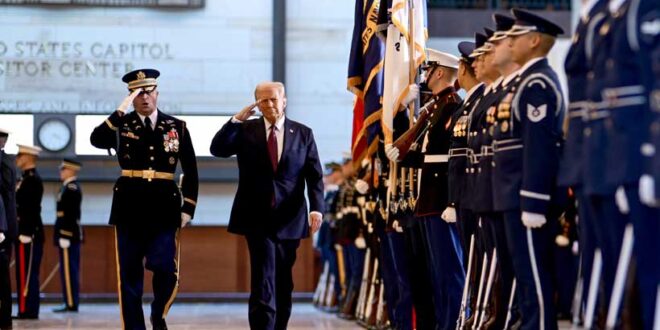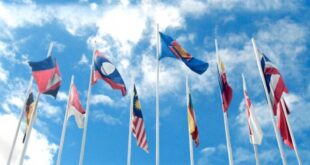Donald J. Trump was inaugurated on January 20, 2025, thus assuming the presidency for his second and final term. The world that awaited President Trump in 2025 is vastly different from the world he strode into as president in 2017. China and Russia are now in a partnership with ‘no limits’; Russia and North Korea are now full military alliance partners; Russia and Iran are now strategic treaty partners; and BRICS has enlarged with a host of countries wanting to join.
The disastrous Biden policy of instigating war with Russia using Ukraine as a proxy has failed in every manner, leaving Ukraine destroyed, great power relations at an all-time low, Germany deindustrializing, Europe in political upheaval, and American power in precipitous decline for all the world to see. Put simply, since leaving office in his first term, the tectonic plates of international politics have shifted in magnitude not seen since 1991 with the end of the Cold War.
In the two weeks since assuming the presidency again, Trump 47 has indicated a willingness to buy or annex Greenland, take back the Panama Canal to stop China’s BRI, threaten Canada, Mexico, and the European Union with trade tariffs, and invite Canada to become the 51st state. Along with this host activity, Ukraine is fast losing the war against Russia with Trump halting all foreign aid (except for Egypt and Israel) and cutting all funding via USAID. The latter is of interest in that it is now known that USAID funding accounted for some 90% of all media funding in Ukraine. It is no wonder the Western narrative has been one of Russian defeat until recently.
In the meantime, Trump’s Secretary of State, Marco Rubio, gave an interview to Megyn Kelly, which had some very interesting bits of information to help decipher and understand Trump’s blizzard of executive actions. First, Rubio barely even mentioned Ukraine, thus reinforcing the notion that President Trump doesn’t want to inherit Biden’s disastrous policy of military defeat in Eastern Europe. The halting of foreign aid and USAID money reinforces the ‘backdoor’ approach of ‘walking away’ from Ukraine in the same manner America has previously walked away from Vietnam and Afghanistan. The Ukraine debacle will likely fall to the Europeans to sort out.
Second, Rubio stated clearly that ‘states have always followed their interests; where interests don’t align and conflicts arise, it’s the role of diplomacy to support those interests and avoid conflict’. He noted America and all other states, especially great powers, follow this logic. This is a clear articulation of realist logic in international politics. Realists stress the primacy of state power, which includes understanding power’s limitations. Further, realists stress the primal role of national interests as being the primary motivator for state policy. Last, realists see the world as moved and organized by great powers that exercise influence through ‘spheres of influence.’. Mutual recognition and respect of other great powers spheres are a given in realist logic. This last point is perhaps most intriguing, providing insights into a possible major shift in the foundation of American foreign policy under the 2nd Trump administration.
Since the end of the Cold War, American presidents have followed a blended realist/liberal internationalist foreign policy. Liberal internationalism has been at the root of American interventions from Kosovo/Serbia to Afghanistan and now, most destructively, in Ukraine. The embrace of an ideologically based liberal foreign policy, according to Mearsheimer, has led to endless wars and a dangerous overextension of America overseas.
Furthermore, the lack of realist thinking has led American foreign policy elites to think that driving NATO up to Russia’s borders was a good idea, which continues to produce deadly outcomes. One can sum up the logical fallacy of liberal internationalism and NATO expansion as such. America and its Western allies claim Ukrainian entry is not the source of the war. Yet, the West now claims that the looming Ukrainian military defeat will allow Russia to push to NATO’s eastern border, thus presenting an existential threat to NATO. Either way, NATO and Russia sharing common borders is an existential threat, so Ukraine’s NATO membership or defeat are both existential crises. The tautological Western argument does not hold upon deeper reflection.
Which brings us to Secretary Rubio’s most insightful comments. He stated that the unipolar moment presented at the end of the Cold War was an anomaly. He goes on to state that the world is now comprised of America, China, and Russia as great powers, and it is in the best interests of all that war and conflict do not arise from this new constellation of power relations.
In essence, Secretary Rubio has signaled that the multipolar world is now a reality, and America must reorient its foreign policy to the new realities. This is how we can understand President Trump’s seemingly erratic and bellicose actions. America is redefining its core interests as centered on the ‘Monroe Doctrine’ of American regional hegemony in the Western Hemisphere. Hence, the actions against Canada, Mexico, Colombia, Greenland, and Panama.
This redefining of core interests, if it coincides with previous Cold War policy, will include American primacy in the Middle East and a drawback in Europe to accommodate Russia’s immediate sphere of influence. The wild card and less likely drawback will be in East Asia, as America’s dominance of the ‘Rimland’ will not easily be abandoned or drawn back. Tariffs against the European Union can be seen in line with Biden’s ‘Inflation Reduction Act,’ which essentially is poaching European industry to move to America after the destruction of Nordstream and European business competitiveness.
Trump will likely continue the pressure on Europe to fuel America’s attempt at revitalization and reindustrialization. Some rapprochement with Russia by letting Ukraine wither will have to take place if Trump is to escape the pit of despair and loss in Eastern Europe. Nations in the Western Hemisphere will increasingly be ‘put into line’ by coercion.
This would be a generous and probable reading of the recent foreign policy drama the world has witnessed in the first two weeks of Trump 2.0. A return to some degree of recognized and respected spheres of influence for the great powers with major question marks hanging over all policy. With America being pushed back in Ukraine and defeat looming for all the world to witness, the era of liberal internationalism is likely at an end.
That being said, if one reflects on the 1st Trump presidency, chaos was the organizing principle. So any predictions, as just made, are subject to radical change depending on the chaos machine that is the Trump White House.
 Geostrategic Media Political Commentary, Analysis, Security, Defense
Geostrategic Media Political Commentary, Analysis, Security, Defense





